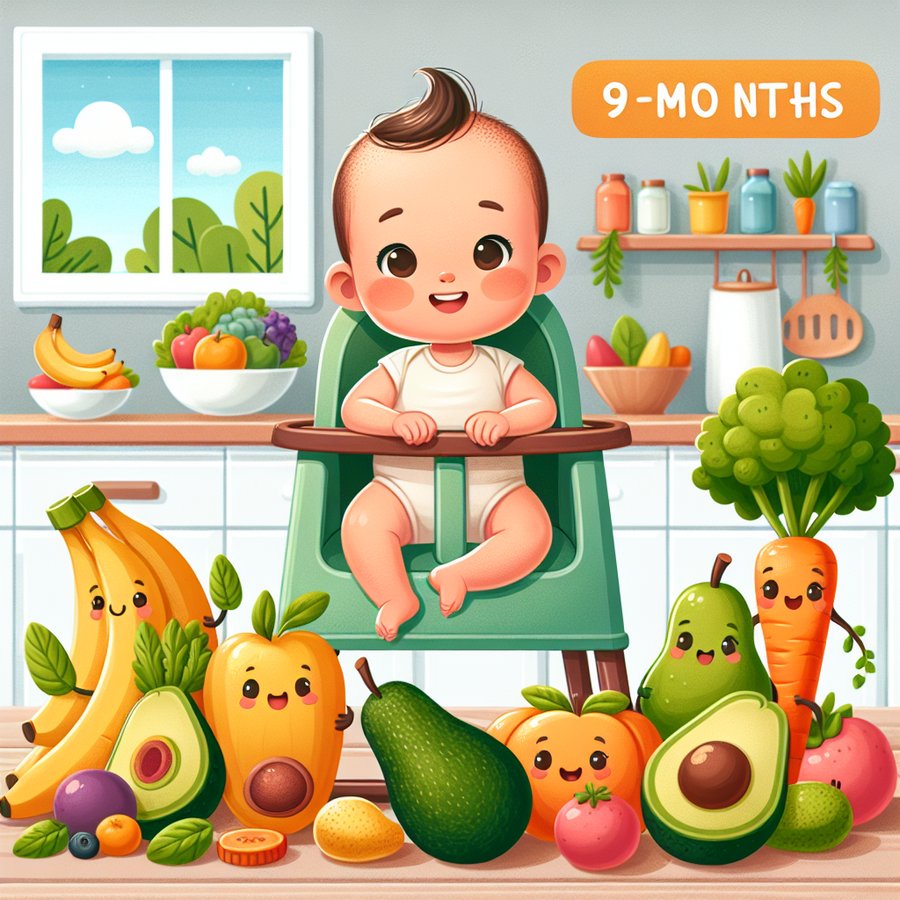Ensuring a balanced vegetarian diet for 9-months-old babies can be both a delightful journey and a challenge for parents. At this stage, your baby is ready to explore a variety of textures and flavors, making it the perfect time to introduce a wide range of vegetarian foods that will not only satisfy their curiosity but also provide them with the nutrients they need for healthy growth and development.
Understanding Nutritional Needs of 9-Month-Old Babies
Before diving into vegetarian diet tips for 9-months-old babies, it’s essential to understand their nutritional needs. At this age, babies require a balanced intake of carbohydrates, proteins, fats, vitamins, and minerals. The World Health Organization emphasizes the importance of introducing a variety of foods to meet these needs.
Protein is especially important in a vegetarian diet, as it’s crucial for growth. Sources like lentils, chickpeas, and quinoa are excellent options. Iron, which is vital for cognitive development, can be found in fortified cereals, beans, and spinach. Including vitamin C-rich foods like oranges, strawberries, and bell peppers in meals can help enhance iron absorption.
Vegetarian Diet Tips for 9-Months-Old Babies
When creating a vegetarian diet for 9-months-old babies, variety is key. Introducing a wide range of vegetables, fruits, grains, and protein sources will ensure they receive all the necessary nutrients. Here are some practical tips to consider:
1. Start with iron-rich foods. Since iron deficiency can be a concern in vegetarian diets, prioritize iron-rich foods like lentils, spinach, and iron-fortified cereals. Pairing these with vitamin C-rich foods can boost iron absorption.
2. Focus on protein diversity. Include a variety of protein sources such as beans, chickpeas, tofu, and dairy products like yogurt and cheese to ensure adequate intake.
3. Incorporate healthy fats. Avocado, olive oil, and chia seeds are great sources of healthy fats essential for brain development.
4. Offer a variety of textures. At 9 months, babies are ready to explore different textures. Soft-cooked vegetables, small pieces of fruit, and mashed beans can help develop their chewing skills.
5. Ensure calcium intake. Calcium is vital for bone development. Include calcium-rich foods like broccoli, kale, and fortified plant-based milk in their diet.
6. Hydrate wisely. Besides breast milk or formula, offer small amounts of water throughout the day, especially in hot weather or if your baby is particularly active.
Incorporating Variety in Your Baby’s Vegetarian Diet
Offering a variety of foods not only ensures a balanced diet but also helps your baby develop a palate for different flavors and textures. Here are some creative ways to incorporate variety:
1. Vegetable and fruit purees: Mix and match vegetables and fruits to create interesting and nutritious purees. For example, blend spinach with apple or carrot with pear.
2. Finger foods: Soft-cooked vegetables like peas, carrots, and cauliflower florets make excellent finger foods that encourage self-feeding.
3. Protein-packed snacks: Small pieces of tofu, lightly mashed chickpeas, and yogurt can serve as protein-rich snacks.
4. Whole grain offerings: Introduce whole grains like oatmeal, quinoa, and brown rice to provide essential B vitamins and fiber.
Remember, every baby is different, and it’s essential to pay attention to their cues and preferences. Introduce new foods one at a time and in small quantities to monitor for any adverse reactions. Additionally, consult with a pediatrician or a nutritionist to ensure your baby’s diet is meeting their nutritional needs.
Useful Resources and Recipes
For parents seeking more information and recipe ideas for a vegetarian diet for 9-months-old babies, many resources are available. Websites like Iron-Rich Vegetarian Recipes for 9-Month-Old Babies, Vegetarian Diet Tips for 9-Months-Old Babies, and Creative Ways to Incorporate Vegetables into a Toddler’s Diet offer a wealth of information to help you provide the best nutrition for your baby. Additionally, consulting with healthcare professionals like pediatric nutritionists can provide personalized advice tailored to your baby’s needs.
Through careful planning and creativity, you can ensure your baby enjoys a varied, nutritious vegetarian diet that supports their growth and development. Remember, the eating habits established in these early months can set the foundation for healthy eating patterns throughout their life.













